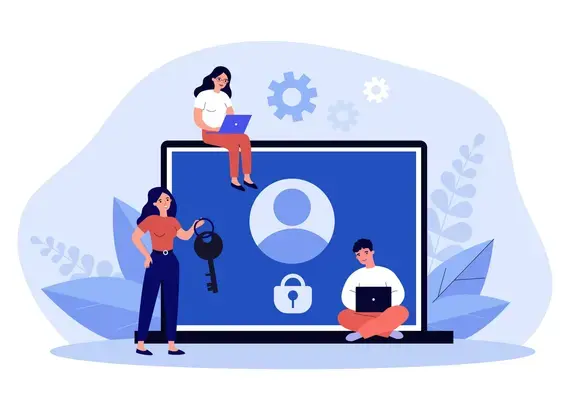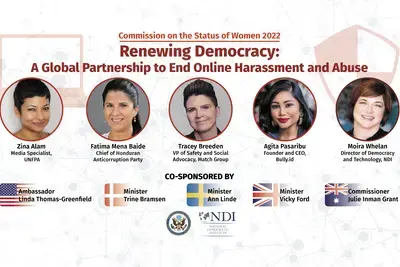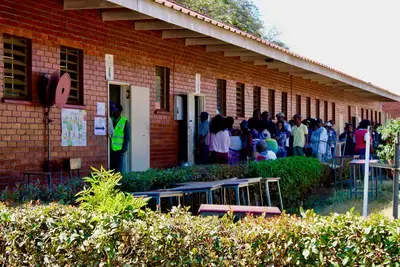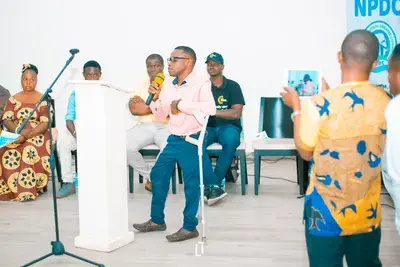
Success Story
Enabling Every Voice through Digital Security
A healthy democracy requires that everyone - especially those who are traditionally marginalized or excluded from civic and political processes - be able to exercise their rights freely. In today’s world, the exercise of such rights and the efforts of civil society organizations to expand and defend them increasingly rely on digital technologies. From AI to Zoom and everything in between, technology continues to open up new avenues for civic organizations to advocate for, mobilize and organize their communities in ways that can encourage governments to be more accountable and create opportunities for citizen-led social and political change. Unfortunately, as has been increasingly evident over the past decade, civil society’s utilization of digital technologies also poses increasingly sophisticated safety and security threats. Whether in the form of a phishing message, a distributed denial-of-service attack, or censorship of communication tools, such threats are often targeted most intensely at those already marginalized. In response to this dynamic, NDI prioritizes digital security support in our work with these communities.
For example, over the past year and a half, the Institute’s DemTech team has worked in coordination with local digital safety experts Fundación Karisma (in Colombia) and SHARE Foundation (in Serbia) to enhance the digital resilience of seven organizations that represent marginalized communities in those two countries. Over the course of a sustained, multi-month process, each group has significantly improved their digital security practices and now reports feeling knowledgeable and confident when it comes to keeping their devices, accounts and online events/activities safe.
When asked about the impact NDI’s programming had on them, a Colombian partner organization working on women’s rights stated, “They have taught us things that were always present but were never evident [to us before]... Although it doesn’t appear like it, digital security is very important. Sometimes, we don’t realize what we are exposed to.”
Building upon organizational security assessments conducted by NDI, Fundación Karisma and SHARE Foundation conducted hands-on digital security workshops and provided dedicated follow-up to each organization, building close relationships with the partners along the way. These workshops and follow-ups not only involved telling the partners about best practices like encrypted messaging, securing accounts, and how to store and share sensitive information, but they also included actually walking them through every step of the process.
For example, in Colombia, Fundación Karisma found malware on the computer of one of the partner organization’s executive staff. Rather than only providing instruction or taking the device and solving it themselves, Fundación Karisma worked side by side with the affected organization to teach through doing. As a result, not only was an urgent incident addressed, but partners were left with the knowledge of how to better proactively protect their computers and respond in case of a future incident - lowering the likelihood of a future attack compromising sensitive data and disrupting their ability to safety and effectively work.
Meeting repeatedly with the digital security trainers built trust and accountability. As one of the partner organizations focused on LGBTQI+ rights shared, “[the workshops] have honestly changed our life as an organization in the sense of how [we] protect…[our] organization’s social media,” thanking the trainers for “giving us this space for knowledge and support.”
In addition to teaching and walking the organization through critical digital security skills, a key focus of the work has been building a strong “culture of security” within each organization. The goal: creating sustainable organizational change. At the heart of this effort is the co-development of an organizational security plan. In conjunction with Fundación Karisma and SHARE Foundation, DemTech developed plans tailored to the specific digital security needs of each of the seven organizations, building upon the findings of holistic organizational risk assessments. These plans serve as living documents that partners can refer back to, update, and change as their risks shift over time.
To ensure such plans would be more than words on a (digital) page, this program set aside specific funding to provide partners with new technology where needed. Swapping out pirated software with licensed or trusted open-source products and replacing outdated computers and phones with newer models that can actually receive updates might not be the most exciting tasks, but they are critical for turning security aspirations into reality. With key technical resources in place, NDI, alongside Fundación Karisma and SHARE Foundation, set aside dedicated time to review the security plans with partners and regularly followed up (in person, on virtual calls, and in quarterly surveys) to ensure partners stayed confident and on track with implementation. The results have been encouraging, with six of the seven organizations either partially or fully implementing all of their high-priority organizational security recommendations. One particular highlight: each group has implemented a strong password policy and has two-factor authentication in place on critical accounts. As one partner summed it up, saying, “[The series of digital security workshops we received through NDI’s support] have been very good and have been something that has given me a lot of peace in a moment where digital security is always at risk.”
Marginalized groups face both unique opportunities and threats in our increasingly digital world. By properly equipping them with the tools they need to defend themselves, we can ensure they can make the most of technology and help them to exercise their voices. A healthy democracy demands every voice is heard, and by helping these communities protect themselves, we are helping to protect the democratic system.



